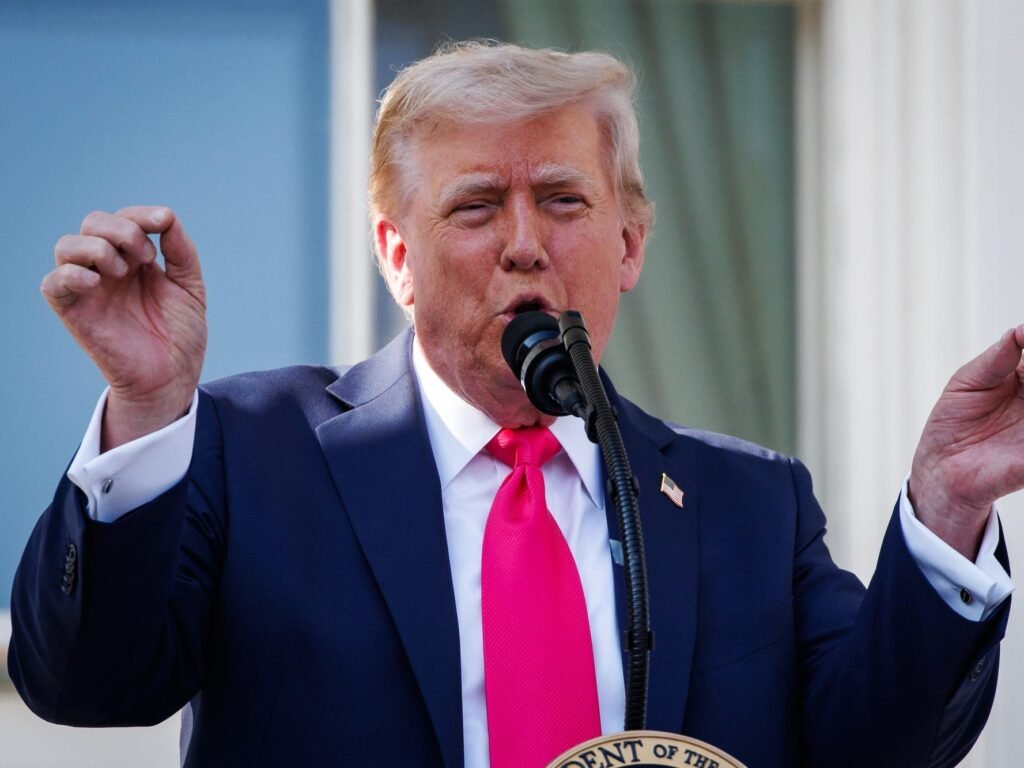
Samuel Corum/Getty Images
- The push to pass DOGE cuts through Congress only became more dramatic this week.
- Trump says anyone who doesn’t support cuts to NPR and PBS won’t have his support in the future.
- Meanwhile, lawmakers are warning that the cuts threaten the bipartisan government funding process.
The push to get DOGE cuts passed through Congress is only becoming more dramatic.
Senators still have questions about the $9.4 billion in cuts to foreign aid and public broadcasting funding. Some are warning that passing the cuts, known as a “rescission,” could upend bipartisan government funding negotiations.
And now, President Donald Trump is turning the cuts, at least those that would affect PBS and NPR, into a political litmus test.
“It is very important that all Republicans adhere to my Recissions Bill and, in particular, DEFUND THE CORPORATION FOR PUBLIC BROADCASTING (PBS and NPR),” Trump wrote on Truth Social on Thursday night. “Any Republican that votes to allow this monstrosity to continue broadcasting will not have my support or Endorsement.”
The package, which includes $1.1 billion in cuts for public broadcasting and $8.3 billion in foreign aid cuts, narrowly passed the House in June on a party-line vote.
But multiple GOP senators have expressed concerns about the rescissions, which will impact HIV/AIDS prevention programs and could affect rural public radio stations.
Senators may seek to amend the package when it comes up for a vote next week. A White House official, granted anonymity to discuss sensitive matters, told BI that the administration wants senators to pass the rescission package in its current form.
If the package is amended before passing the Senate, then it would need to pass the House again.
And if no bill is approved by the end of the day on July 18, the administration will be required by law to spend all of that money.
‘Absurd for them to expect Democrats to act as business as usual’
In addition to pressure from Trump, GOP senators will have to weigh an ultimatum from Senate Democrats.
In a letter to colleagues this week, Senate Minority Leader Chuck Schumer argued that making the DOGE cuts on a party-line basis undermines efforts to fund the government for the next fiscal year.
Because of the Senate’s filibuster rule, it takes 60 votes to clear most bills through the upper chamber. That means that government funding bills are typically negotiated with significant input from both parties, with the minority often able to secure priorities that the majority party otherwise wouldn’t support to ensure passage.
But rescissions only take 51 votes, and the administration has said that this could be the first of several. That raises the possibility that Republicans could move to unilaterally defund Democratic priorities after government funding bills are passed in the future.
“It is absurd for them to expect Democrats to act as business as usual and engage in a bipartisan appropriations process to fund the government, while they concurrently plot to pass a purely partisan rescissions bill to defund those same programs negotiated on a bipartisan basis behind the scenes,” Schumer said in the letter.
If lawmakers can’t agree on how to fund the government in the coming fiscal year by September 30, a government shutdown would take place.
Some Republican senators have acknowledged the validity of Democratic senators’ argument.
“If we get to the point where the Democrats look at this and say, ‘We can put it in the bill, but they’re not going to fund it, or they’re not going to use it,’ then there’s no reason for them to work with us to get to 60 votes,” Sen. Mike Rounds of South Dakota told BI last month.
However, not every Republican is worried about the integrity of the current appropriations process, particularly those who remain concerned about high government spending.
“The appropriations process should be undermined,” Sen. Ron Johnson of Wisconsin told BI, saying the current process is “bankrupting” the country. “That needs to be busted up.”






